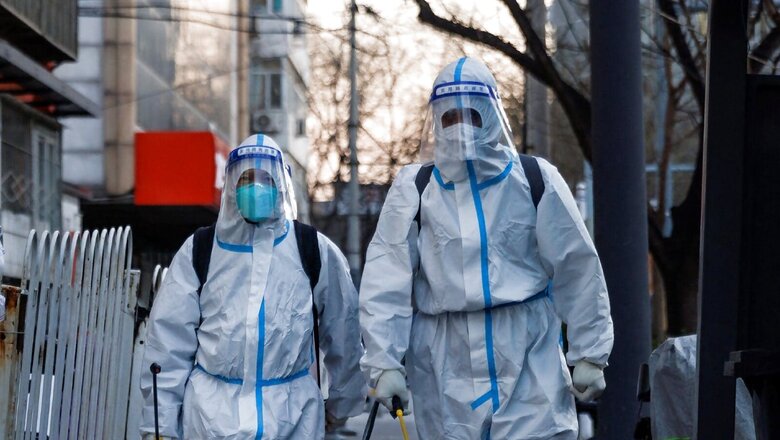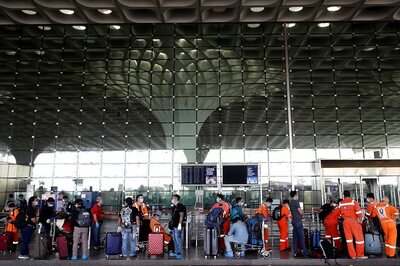
views
China is presently seeing an unprecedented Covid-19 increase, and the Chinese healthcare system is overburdened. The current increase in Covid-19 infections in China is being driven by BF.7 Omicron sub-variant. Medicine shortages have also been reported, raising concerns that Chinese officials are concealing the full scope of the infections.
Now, the new variant has been detected in India too. Numbers may be small, but the government is worried, and citizens are put on alert. Let us know everything about the novel sub-variant of the extremely infectious Omicron variant of coronavirus.
What is the Omicron BF.7 Variant?
The new subvariant BF.7, is a sub-lineage of the BA.5 Omicron variant, which is reportedly the most infectious variant known so far since the discovery of SARS-CoV-2 in 2020. The latest variant is believed to be highly infectious as compared to the Delta BA.1, BA.2, and BA.5 variants detected previously, spreads quicker than expected. It also has a higher capacity to cause reinfection or infect even those vaccinated, a PTI report said.
The BF.7 sub-variant has more “immune escape capacity” than earlier Omicron variants BA.1, BA.2, and BA.5. As per experts, the variant can multiply and infect 10 and 18.6 people in one go if an infected person is exposed to the non-infected. Its reproduction number, or RO, is 10 to 18.6, whereas Delta’s RO was 5 or 6.
According to a study published in the journal ‘Cell Host and Microbe,’ the BF.7 variant has 4.4-fold higher neutralization resistance than the original Wuhan virus. This means the antibodies from the vaccination are not effective enough against the virus.
Read | Why Delhi Air Worsens During Winters? Learn in ClassesWithNews18
Symptoms of Omicron BF.7 Variant
BF.7 mainly causes upper respiratory infection, meaning congestion in the higher parts of the chest and near the throat. Fever, sore throat, runny nose, and cough are other common symptoms. Some people may get stomach-related symptoms like vomiting and diarrhea. This variant may not lead to any severe complications but can spread faster. Therefore, early detection and isolation are extremely crucial. Doctors advise that getting tested immediately is important as it can help stop the spread by ensuring early decisions on isolation and recovery drugs.
The Situation in China
China is currently struggling with possibly the biggest Covid outbreak the world has seen since the coronavirus was first detected in 2019. It is facing a massive crisis after it eased its Covid-19 restrictions earlier this month. The hospitals, and emergency wards are flooded with patients, while crematoriums and funeral homes are dealing with long queues as dead bodies remain piled up due to the sudden surge.
As per news reports, BF.7 started spreading in October, and cases were reported in the United States and several European countries. The latest surge in China could be because of the relaxation of its ‘Zero Covid’ policy following a wave of intense nationwide protests by people. It is believed that a low level of immunity due to previous infections can be one of the major reasons behind the surge in China. Experts and projections have predicted that the situation could get severe in the coming winter months.
Read | What is Climate And How Is It Different From Weather, Let Us Learn in #ClassesWithNews18
What is the Situation in India?
India has been reporting fewer than 200 cases a day for several days now. The country has however reported four Covid-19 cases caused by the BF.7 variant till now. Three cases have been reported from Gujarat and one has been confirmed from Orissa. All four patients were either asymptomatic or had mild symptoms. The cases were recorded in July, September, and November. Health Minister Mansukh Mandaviya urged people to follow Covid-appropriate behaviour. “COVID is not over yet. I have directed all concerned to be alert and strengthen surveillance. We are prepared to manage any situation,” he wrote in a tweet.
Prime Minister Narendra Modi is meeting ministers and top officials to review the Covid situation in India, and states have been told to advise masks and social distancing, particularly ahead of the New Year. Mandatory restrictions are not yet back. The Indian government has started random testing of visitors from abroad – 2 per cent of all landing. Flight to and from China are already banned. The government has also requested states and union territories to send samples of all Covid positive cases to Indian SARS-CoV-2 Genomics Consortium (INSACOG) labs to track new variants if any.
Impact on Other Countries
Currently, China, Japan, South Korea, France, and the United States have been reporting an alarming surge in Covid-19 cases. BF.7 has been detected in several other countries around the world including the UK, Belgium, Germany, and Denmark. But it is not necessarily behaving as dangerously in countries other than China.
The UK, for sintance, had assessed BF.7 as among the most concerning variants two months ago, it has scaled down its estimation of how serious it is. BF.7 accounted for more than 5 per cent of US cases and 7.26 per cent of UK cases in October. Scientists in the West were watching the variant closely; however, there was no dramatic increase in the number of cases or hospitalisations in these countries.
To learn about other topics taught in school, explained by News18, here is a list of other Classes With News18: Queries Related to Chapters on Elections | Sex Versus Gender | Cryptocurrencies | Economy & Banks | How to Become President of India | Post Independence Struggle | How India Adopted Its Flag | Formation of States & United India | Tipu Sultan | Indian Teachers Day Different from Rest of the World |Queen Elizabeth & Colonialism |
Read all the Latest Education News here














![Hyundai Grand i10 Nios Launch Today - Watch it Live Here [Video]](https://cdn.sharpss.com/news/66/ab/e3/66abe3055e828e6c5deb46a1d469c9a9-s.jpg)


Comments
0 comment